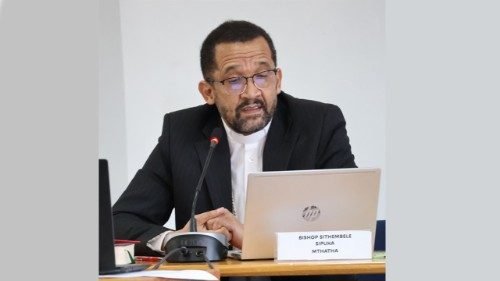In his welcome address to members of the Southern African Catholic Bishops Conference (SACBC) gathered in Mariannhill Diocese for the 5 August to 9 Plenary Session, Bishop Sithembele Anton Sipuka also welcomed the newly appointed Apostolic Nuncio to Southern Africa.
Sheila Pires – Pretoria.
As his second term as president of the SACBC comes to an end, Bishop Sithembele Sipuka, in his opening remarks, outlined some of the achievements and challenges faced by the Conference’s three member states: Botswana, Eswatini, and South Africa. The Bishop also took time to welcome the newly appointed Apostolic Nuncio to Southern Africa.
“We are glad you finally arrived,” said Bishop Sipuka as he welcomed Archbishop Henryk Mieczysław Jagodziński.
Achievements and challenges
In his Tuesday, 6 August Address, Bishop Sipuka walked the Bishops through several critical issues that the Conference has dealt with in recent years. These include the implementation of the SACBC 2020 Pastoral Letter, social and political issues, shortage of vocations to the priesthood and religious life, Catholic minority in the region, fundraising initiatives amid economic constraints and high levels of unemployment, demarcation of Dioceses, and the limited evangelical influence through Catholic education due to running most Catholic schools in “collaboration with the government,” as well as the possibility of establishing a Catholic institution of higher education led by the Future Vision task team.
Peaceful elections in South Africa commended
The Local Ordinary of Mthatha Diocese further discussed the recent general elections in South Africa and the upcoming elections in Botswana. He lauded South Africa’s peaceful elections, the creation of a Government of National Unity, and the reduction in hours of electricity load shedding.
Bishop Sipuka commended South Africa for remaining a politically stable country. He, however, said the country still has much to do in the areas of corruption, money laundering, and crime. Other areas of concern to the Conference include the ongoing conflicts in the Middle East and other war-torn countries.
Appreciation for Pope Francis
Bishop Sipuka thanked Pope Francis for his “pastoral solicitude” and initiatives.
In his concluding remarks, Bishop Sipuka addressed himself to the Synod on Synodality. He called for an ongoing discussion with regard to the shortage of vocations to the priesthood and religious life. The situation, he said, has led many Catholics, especially in rural areas, to be deprived “of the major source of Catholic identity, the Eucharist.”



